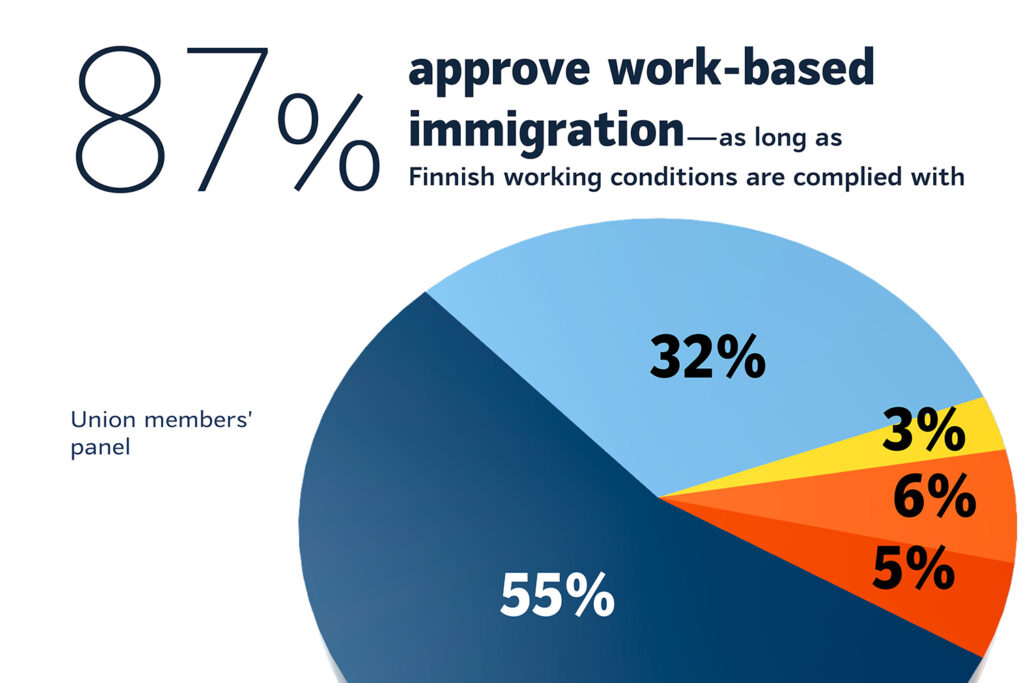Eliminating the exploitation of workers through hard and long-term work
In her work, Senior Officer Katja-Pia Jenu sees ideological racism only rarely, but problems with wages are all the more common. The exploitation of foreign workers can only be eliminated through long-term effort, communication and fines.
“Although studies have shown that there is a lot of racism in Finland, this rarely comes up in my work as my focus is on the oversight of employers. Racism in the more broad form of unequal treatment, however, is something that I do see in my work,” says Katja-Pia Jenu, Senior Officer at the Division of Occupational Safety and Health of the Regional State Administrative Agency for Southern Finland.
“At the Division of Occupational Safety and Health, we have a separate helpline for well-being at work and discrimination cases that people can contact if they have personally encountered discrimination or racism.”
In her role, Jenu oversees that employers using foreign labour comply with the minimum pay and other terms of universally binding collective agreements. Among other things, this means that the wages and other terms of employment of foreign workers must be in line with those of other employees of the company or other companies in the same industry.
According to Jenu, she rarely comes across situations in which the exploitation of foreign workers in the form of significantly lower pay or longer hours, for example, is done for purely ideological reasons.
“Discrimination at work takes many forms. People who have personally experienced discrimination can contact us through the helpline. In my work, I encounter discrimination as part of work-related exploitation, with financial gain the underlying reason in nearly all cases.”
ISSUES WITH WAGES ARE COMMONPLACE
According to the oversight report by the Occupational Safety and Health Administration, last year, regional state administrative agencies carried out more than 2,200 inspections of companies using foreign labour in Finland.
About half of the inspections concerned the enforcement of minimum terms of employment. Many shortcomings were observed. Inspectors of regional state administrative agencies reported problems with wages in nearly half, or 47%, of inspections where the issue was under evaluation.
Issues related to wages varied in their degree of severity. In some companies, the shortcomings were minor, such as unpaid evening supplements, while others had evidence of serious work-related exploitation.
“The results clearly show that problems with the payment of wages are commonplace. Still, it should be kept in mind that the companies were selected for inspection based on risk estimates, which means that we are either aware of problems in the industry or have received an inspection request from a third party or another public authority or some other kind of tip-off.”
In addition, Jenu stresses that problems with the payment of wages come in many shapes and forms. Minor shortcomings are clearly more common that serious violations.
Work-related exploitation is almost always driven by financial gain.
Last year, inspectors also monitored companies’ compliance with the prohibition of discrimination. This means that employees cannot be discriminated in terms of pay based on their origin or nationality.
The authorities issued a total of 113 injunctions related to the ban of discrimination. In other words, violations of the ban were observed in 11% of inspections. The number of injunctions was at the same level as in 2022.
In the supervision of seasonal labour, regional state administrative agencies carried out a total of 69 inspections related to the ban on discrimination. Of these employers, 9% were issued an injunction for failing to comply with the ban.
“Situations in which an injunction has been issued are clear cases of discrimination, where the employer has not been able to disprove the presumed discrimination detected by the inspection. Sometimes, the situation is not that clear. There are workplaces where discrimination is suspected to have taken place but cannot be proved due to the employer’s failure to keep track of working hours, for example.”
“In serious violations of the law and criminal offences, the inspector is required to report the matter to the police. Last year, regional state administrative agencies filed 24 police reports for discrimination and extortion in employment and 5 reports for human trafficking.”
AT-RISK INDUSTRIES UNDER SCRUTINY
Most of the inspections performed by the authorities last year focused on hospitality and food service companies. Construction firms made up a slightly smaller percentage of the total. Industrial companies accounted for 6% and companies that employ seasonal workers 8% of the inspections.
Jenu says that the industries covered by the inspections are based on observations from previous years, tip-offs received and the degree to which foreign labour is used in the industry. However, no industry is outside the scope of the authorities’ inspections.
“For example, we receive very few requests for inspection and tip-offs for industrial companies. The number of inspections in industrial sectors could be higher if more requests for inspection were filed. It’s good to keep in mind that the authorities can also be tipped off anonymously.”
LONG-TERM WORK IS NEEDED
Jenu believes that preventing exploitation in employment requires diverse and long-term efforts.
“Informing workers about the terms of employment in Finnish workplaces is one method. An example of this is the Industrial Union’s Hermes app. It is also important that there are channels through which people can report problems. This requires ensuring that authorities and non-profits have the necessary resources,” Jenu says.
“In addition, if and when problems arise, violators must be held criminally liable. A sufficient number of precedent cases are needed in which the employer is penalised for exploitation. Precedents help prevent exploitation and encourage the reporting of similar problems in the future.”




